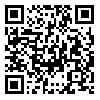Volume 12, Issue 5 (September & October 2021)
BCN 2021, 12(5): 693-702 |
Back to browse issues page
Download citation:
BibTeX | RIS | EndNote | Medlars | ProCite | Reference Manager | RefWorks
Send citation to:



BibTeX | RIS | EndNote | Medlars | ProCite | Reference Manager | RefWorks
Send citation to:
Dashbozorgi Z, Ghaffari A, Karamali Esmaili S, Ashoori J, Moradi A, Sarvghadi P. Effect of Neurofeedback Training on Aggression and Impulsivity in Children With Attention-Deficit/Hyperactivity Disorder: A Double-Blinded Randomized Controlled Trial. BCN 2021; 12 (5) :693-702
URL: http://bcn.iums.ac.ir/article-1-1695-en.html
URL: http://bcn.iums.ac.ir/article-1-1695-en.html
Zahra Dashbozorgi1 

 , Amin Ghaffari2
, Amin Ghaffari2 

 , Samaneh Karamali Esmaili2
, Samaneh Karamali Esmaili2 

 , Jamal Ashoori3
, Jamal Ashoori3 

 , Ali Moradi4
, Ali Moradi4 

 , Pooria Sarvghadi *5
, Pooria Sarvghadi *5 




 , Amin Ghaffari2
, Amin Ghaffari2 

 , Samaneh Karamali Esmaili2
, Samaneh Karamali Esmaili2 

 , Jamal Ashoori3
, Jamal Ashoori3 

 , Ali Moradi4
, Ali Moradi4 

 , Pooria Sarvghadi *5
, Pooria Sarvghadi *5 


1- Department of Psychology, Ahvaz Branch, Islamic Azad University, Ahvaz, Iran.
2- Department of Occupational Therapy, School of Rehabilitation Science, Iran University of Medical Sciences, Tehran, Iran.
3- Department of Psychology, Isfahan (Khorasgan) Branch, Islamic Azad University.
4- Orthopedic Research Center, Mashhad University of Medical Sciences, Mashhad, Iran.
5- Department of Occupational Therapy, School of Rehabilitation Sciences, Shahid Beheshti University of Medical Sciences, Tehran, Iran.
2- Department of Occupational Therapy, School of Rehabilitation Science, Iran University of Medical Sciences, Tehran, Iran.
3- Department of Psychology, Isfahan (Khorasgan) Branch, Islamic Azad University.
4- Orthopedic Research Center, Mashhad University of Medical Sciences, Mashhad, Iran.
5- Department of Occupational Therapy, School of Rehabilitation Sciences, Shahid Beheshti University of Medical Sciences, Tehran, Iran.
Abstract:
Introduction: Aggression and impulsivity are some of the behavioral symptoms of Attention-Deficit/Hyperactivity Disorder (ADHD). Neurofeedback (NF) training has been suggested as a promising treatment in these children. This study aimed to investigate the effect of NF training on aggression and impulsivity in schoolchildren with ADHD.
Methods: A total of 40 male elementary school children with ADHD (aged 11.17±0.97 years) were randomized into the NF and sham groups. The NF group received 12 NF training sessions, each taking about 60 minutes for six consecutive weeks (twice a week), based on the Hammond protocol. The subjects’ parents were questioned to evaluate the outcomes, including aggression and impulsivity, using the Buss-Perry Aggression Questionnaire (BPAQ) and Barratt Impulsiveness Scale (BIS).
Results: After the intervention, in the NF group, the BPAQ score changed from 87.60±9.33 to 81±7.23 and the BIS score from 94.7±7.25 to 88.05±5.4, which were significant (P=0.001). The results indicated the large effect size of NF on aggression and impulsivity in ADHD.
Conclusion: Our findings suggest NF training as a clinically applicable method for decreasing aggression and impulsivity, also support concurrent use of medication and NF training in children with ADHD.
Methods: A total of 40 male elementary school children with ADHD (aged 11.17±0.97 years) were randomized into the NF and sham groups. The NF group received 12 NF training sessions, each taking about 60 minutes for six consecutive weeks (twice a week), based on the Hammond protocol. The subjects’ parents were questioned to evaluate the outcomes, including aggression and impulsivity, using the Buss-Perry Aggression Questionnaire (BPAQ) and Barratt Impulsiveness Scale (BIS).
Results: After the intervention, in the NF group, the BPAQ score changed from 87.60±9.33 to 81±7.23 and the BIS score from 94.7±7.25 to 88.05±5.4, which were significant (P=0.001). The results indicated the large effect size of NF on aggression and impulsivity in ADHD.
Conclusion: Our findings suggest NF training as a clinically applicable method for decreasing aggression and impulsivity, also support concurrent use of medication and NF training in children with ADHD.
Type of Study: Original |
Subject:
Behavioral Neuroscience
Received: 2020/01/30 | Accepted: 2021/01/6 | Published: 2021/09/1
Received: 2020/01/30 | Accepted: 2021/01/6 | Published: 2021/09/1
Send email to the article author
| Rights and permissions | |
 |
This work is licensed under a Creative Commons Attribution-NonCommercial 4.0 International License. |





